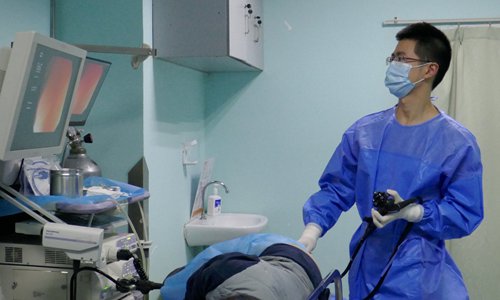
From the People's Daily app.
And this is Story in the Story.
China is using artificial intelligence (AI) technology to revolutionize medical diagnostics while striving to make medical care equally available across the country's rural and urban areas.
In 2018, an AI system defeated doctors in a brain tumor diagnosis competition in Beijing.
Colorectal cancer is the second most common gastrointestinal tumor in China, with the mortality rate at 29.44 per 100,000 people, according to a 2014 Chinese Cancer Registry Annual Report.
Colorectal cancer can be cured in its early stages with a 90 percent five-year survival rate, and detecting polyps is a key part of this process.
Today’s Story in the Story looks at how an AI system boosts detection rate of cancer-causing polyps and what shortcomings the system has.

Doctor Wang Pu carries out an AI-aided colonoscopy on a patient at Sichuan Provincial People's Hospital in Chengdu, Southwest China's Sichuan Province in February. (Photo: Global Times)
Chinese doctors, together with researchers from Harvard Medical School, jointly found that an AI system is able to significantly increase the detection rate of colorectal polyps, which can develop into cancer if left untreated.
The study was co-authored by Chinese doctors at the Sichuan Academy of Medical Sciences and Sichuan Provincial People's Hospital in Chengdu, Southwest China's Sichuan Province, AI company Shanghai Wision AI, as well as researchers at the Israel Deaconess Medical Center and Harvard Medical School in Massachusetts, the US.
The randomized controlled experiment was carried out at the Sichuan Provincial People's Hospital. A total of 1,058 patients were split into two control groups - one accepting normal colonoscopy (536 patients) and the other accepting the AI-aided colonoscopy (522 patients), according to Wang Pu, the first author of the paper, who is also a gastroenterologist at Sichuan Provincial People's Hospital.
"The adenoma detection rate (ADR) of the normal group is 20 percent and the AI-aided group's ADR is 29 percent. As a result, the AI-aided ADR rose by more than 40 percent compared with the normal group's ADR," Wang said.
He said that as long as the accuracy of the AI system is of a high level, it will have better concentration and stability than that provided by humans.
Developed by Wision AI's computer aided diagnosis algorithms and systems in clinical imaging, the system can remind doctors of polyps that may have been neglected.
Liu Xiaogang, director of the Gastroenterology Department at Sichuan Provincial People's Hospital, noted that the research is the first prospective, randomized and comparative clinical study with the deep learning AI system application in the field of gastroenterology worldwide.
(Photo: VCG)
Another significance of the research may lie in assisting and supervising novice doctors, according to both Wang and Liu.
"China has always had a problem of unfair distribution of medical resources, specifically, doctors. The AI-aided remote diagnosis technology can partly improve the situation. I believe in the near future some easy and repetitive work could be given to AI machines. Or, when I'm treating patients, the machine could help share my responsibilities, as a helper," Liu said.
Liu applauded the research finding, but added the system still had shortcomings.
"Doctors need to observe illnesses with their eyes, so they may get tired after a long time, and the AI system can notify me of polyps using sound. Occasionally, I find a tiny polyp and the machine does not remind me, so I'll think, doesn't the machine see the polyp?" Liu said, noting he already relies on the system a little bit.
Wang noted that at the current stage, AI cannot replace doctors.
"There are many decision-making moments as well as operational work that cannot be done by AI. Moreover, AI companies cannot take responsibility for medical liability and legal issues," he said.
He added that doctors should trust themselves instead of leaving it totally to machines to make decisions.
"In terms of the accuracy of the verification and medical liability of doctors at the legal level, the AI machine is just a helper. We cannot trust it completely," he said.
(Produced by Nancy Yan Xu, Elaine Yue Lin, Brian Lowe, Lance Crayon, and Chelle Wenqian Zeng. Music by: bensound.com. Text from China Daily.)


